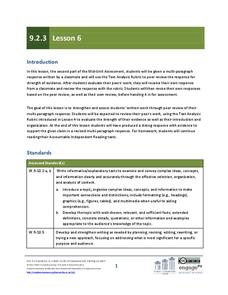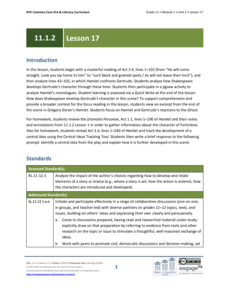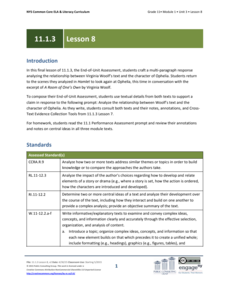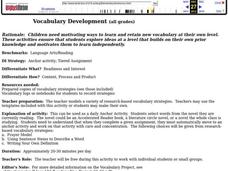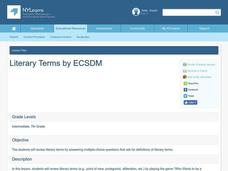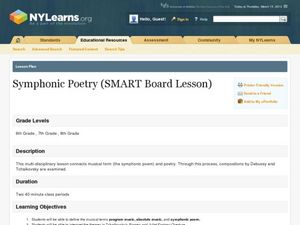EngageNY
Grade 9 ELA Module 2, Unit 3, Lesson 6
As part of a mid-unit assessment, class members exchange their draft of a multi-paragraph essay with a classmate, review their partner's writing using the provided text analysis rubric, and evaluate the strength of evidence, the...
EngageNY
Grade 9 ELA Module 3, Unit 2, Lesson 12
Ninth graders synthesize their inquiry paths, research process, and claim formulation with a writing assessment at the end of the unit. Learners write a one-page perspective about their conclusions from the research process and outcomes...
EngageNY
Grade 9 ELA Module 3, Unit 3, Lesson 4
The fourth activity in a unit on crafting a research paper focuses on cohesion within and between paragraphs. Class members examine models that lack cohesion and ones that are cohesive and logically developed before using what they have...
EngageNY
Grade 9 ELA Module 4, Unit 1, Lesson 22
Class members read "Satyagraha," the concluding section of Marc Aronson and Marina Budhos' Sugar Changed the World: A Story of Magic, Spice, Slavery, Freedom, and Science, and analyze how the authors support their claim that terrible...
EngageNY
Grade 10 ELA Module 4: Unit 3, Lesson 4
According to Machiavelli, a good ruler does whatever it takes. Using the resource, scholars work in small groups to analyze quotes from The Prince and then participate in a whole-class discussion. To finish, pupils select a phrase and...
EngageNY
Grade 10 ELA Module 4: Unit 3, Lesson 3
What's the difference between men and princes? Machiavelli discusses this distinction in chapter 18 of The Prince. Scholars first listen to a masterful reading of the chapter. Then, they write about how the author develops a central idea...
EngageNY
Grade 11 ELA Module 1: Unit 3, Lesson 3
Virginia Woolf didn't believe a woman could have written Shakespeare's works. Using the resource, scholars engage in a silent discussion to analyze how Woolf uses rhetoric to convey her point of view in A Room of One's Own. Pupils write...
EngageNY
Grade 11 ELA Module 1: Unit 2, Lesson 21
Rest in peace, Ophelia! Scholars read about Ophelia's burial in Act 5.1 of Shakespeare's Hamlet. They complete a Quick Write to analyze the characters' reactions to Ophelia's death.
EngageNY
Grade 11 ELA Module 1: Unit 2, Lesson 17
Why is Hamlet so upset with Gertrude? Using the resource, scholars read Act 3.4 of Hamlet, analyzing how Shakespeare develops Gertrude's character in the scene. Next, pupils participate in a jigsaw activity to discuss Hamlet's monologues.
EngageNY
Grade 11 ELA Module 1: Unit 2, Lesson 15
Scholars continue reading Act 3.1 from Shakespeare's Hamlet, discovering Ophelia's monologue about Hamlet. They complete a Quick Write to analyze Ophelia's perspective of Hamlet and participate in an optional jigsaw activity to explore...
EngageNY
Grade 11 ELA Module 1: Unit 2, Lesson 12
How does Shakespeare develop the main ideas in Hamlet? Using the resource, scholars continue analyzing the famous monologue from the play. They identify a central idea from the passage and write to explain how it relates to other central...
EngageNY
Grade 11 ELA Module 1: Unit 3, Lesson 5
There's a fine line between madness and genius. Using the resource, scholars complete a mid-unit assessment based on their study of Virginia Woolf's A Room of One's Own. They write a multi-paragraph response, analyzing how two central...
EngageNY
Grade 11 ELA Module 1: Unit 3, Lesson 8
How does the theme of gender inequality develop in Virginia Woolf's A Room of One's Own and Shakespeare's Hamlet? Pupils craft a multi-paragraph response to analyze the relationship between the texts. They use evidence from both works to...
EngageNY
Grade 11 ELA Module 2: Unit 2, Lesson 3
What is the distinction between rights and equality? Scholars continue their analysis of "An Address by Elizabeth Cady Stanton" using the third instructional activity from the 14-part Grade 11 ELA Module 2: Unit 2 series. Pupils complete...
EngageNY
Grade 11 ELA Module 2: Unit 2, Lesson 11
In Audre Lorde's poem "From the House of Yemanjá," the speaker describes her mother's two faces, adding a whole new meaning to the phrase "two-faced." Pupils first read the final stanza of the contemporary poem. With a Quick Write, they...
EngageNY
Mid-Unit Assessment: Analyzing an Informational Text about a Refugee Experience
Refugee & Immigrant Transitions is an organization that helps newcomers adjust to life in the United States through education and community leadership opportunities. As part of a mid-unit assessment, pupils independently read a...
EngageNY
Grade 11 ELA Module 1: Unit 2, Lesson 7
Following a ghost's advice may not be in anyone's best interest, but that doesn't stop Hamlet! Using an exciting resource, pupils continue reading Act 1 of Shakespeare's Hamlet, in which the ghost tries to convince Hamlet to seek revenge...
PBS
A Time and Place: The Importance of Setting in To Kill a Mockingbird
A strong community acts as a family during difficult times. The evidence for the family aspects of Maycomb is abundant in Harper Lee's To Kill a Mockingbird, and it is the focus of a activity on the importance of setting as it relates to...
Curated OER
Vocabulary Development
Learners utilize various vocabulary strategies. They use vocabulary logs to record strategies they have been taught, such as the Frayer Model (definition, picture, examples, non-examples), writing their own definitions, and using...
Curated OER
Literary Terms
"Is that your final answer?" Challenge and thrill your class with this language arts game, which is based on "Who Wants to Be a Millionaire." The game covers literary terms such as point of view, alliteration, and protagonist, and is...
Curated OER
Reader Response
Fifth graders reflect upon different concepts of Language Arts while reading literature. In the novel Tuck Everlasting, by Natalie Babbitt, the characters discover a spring of eternal youth. After reading the first several chapters of...
Curated OER
Symphonic Poetry (SMART Board Lesson)
Let music and poetry collide in this well-orchestrated language arts lesson plan. After studying program music and C. Debussy's Prelude to an Afternoon Faun, view the attached SMART board lesson plan to read through "Fog" by Carl...
Curated OER
Elements of a Story - Plot, Characters, and Setting
Use this SMART board activity with any short story in your unit plan. The SMART board file contains a step-by-step guide to plot diagrams, including an interactive practice page and an assignment. This resource is beneficial for language...
Curated OER
Implied Main Idea
Reinforce main idea and supporting details with your seventh graders in this language arts lesson. Using a SMART board presentation and handouts (all attachments are provided), they review and practice finding main idea and details in...


